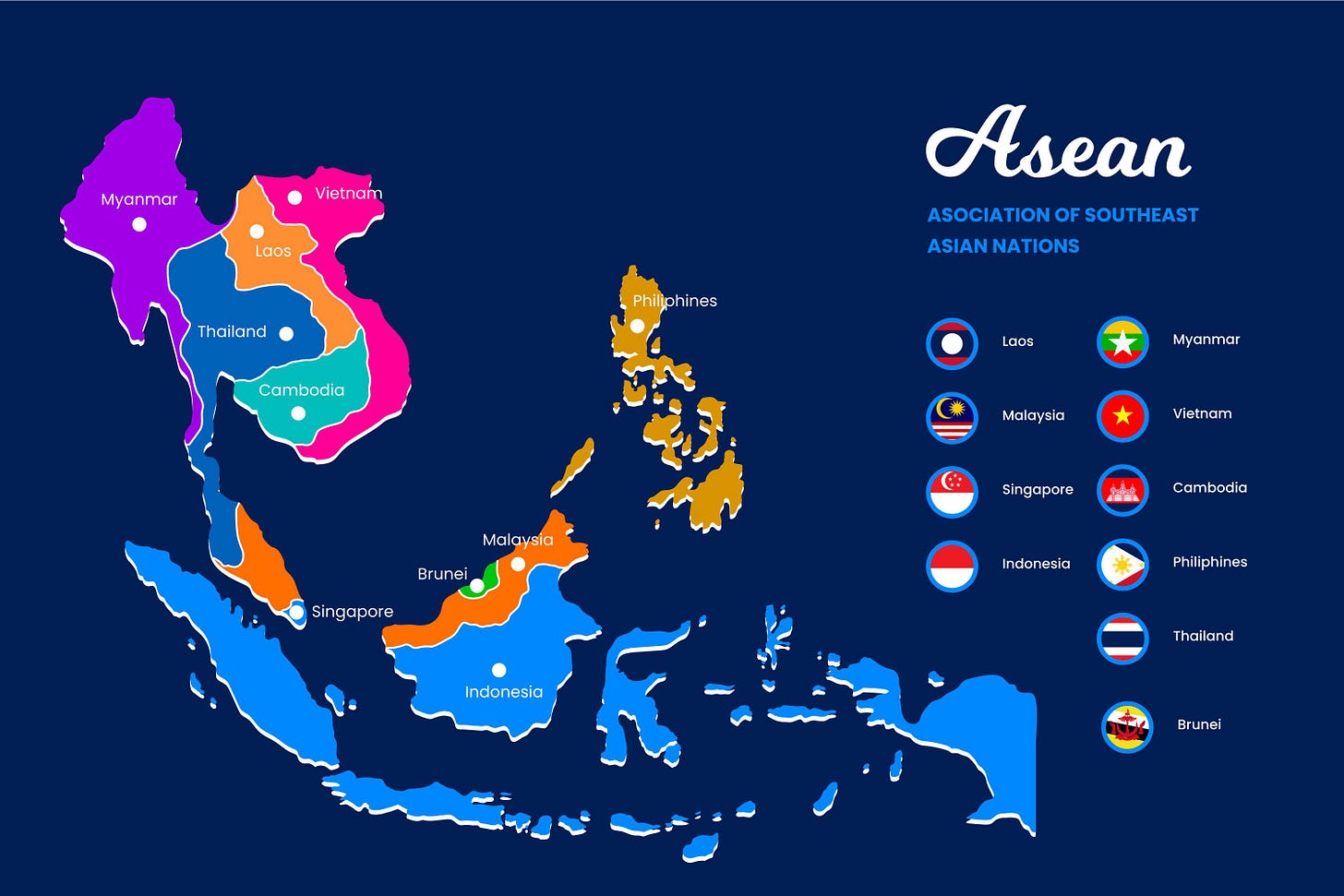Embracing Homegrown Currencies: ASEAN Nations United Against the U.S. Dollar Dominance
Southeast Asian and ASEAN leaders are pushing for local currency use over the U.S. dollar, potentially reshaping global finance.
It's a seismic shift in Southeast Asia's financial landscape. The 10 ASEAN nations - Brunei, Cambodia, Indonesia, Laos, Malaysia, Myanmar, Philippines, Singapore, Thailand, and Vietnam - have collectively chosen to promote their native currencies for cross-border transactions, shaking off the previous reliance on the U.S. dollar. This move could significantly bolster their currencies and expedite their respective economic growth. But what prompted this surprising decision, and what are its implications for the global economy?
Breaking Away From the U.S. Dollar
The leaders of 10 Southeast nations and the members of the Association of Southeast Asian Nations (ASEAN) have agreed to promote their native currencies for cross-border transactions
The decision to encourage the use of local currencies for economic and financial transactions comes in the wake of growing economic uncertainty and the escalating desire to strengthen national sovereignty. The move is not about turning a cold shoulder to the U.S. dollar but about creating a more balanced and diversified financial ecosystem.
Aiming for Economic Independence
ASEAN nations are keen to minimize their dependency on the U.S. dollar. It's a gamble, no doubt, but the potential pay-off is colossal – a stronger, more resilient economy that is less susceptible to external shocks.
The Game Plan
The ASEAN nations will reduce settling payments with the U.S. dollar, opting instead to transact in their local currencies. It's a monumental task, but one that is necessary for the region's financial independence.
The Benefits of Trading in Local Currencies
Speedy, Affordable, and Seamless Transactions
Trading in local currencies could make it faster, cheaper, and easier to close deals. There's no need to grapple with exchange rate volatility, making transactions more predictable and less risky.
Boosting Native Currencies
The move could significantly boost the value of native currencies. With increased demand, the value of the local currencies is expected to appreciate, benefiting the domestic economy.
The ASEAN Leaders Declaration and Its Implications
Promoting Local Currency Transactions
The official declaration emphasizes promoting local currency transactions to strengthen economic integration by enabling fast, seamless, and more affordable cross-border payments across the region.
Strengthening Bilateral and Multilateral Payment Activities
The declaration underlines the goal of strengthening bilateral and multilateral payment activities. It's not just about economic independence; it's also about fostering stronger economic ties between ASEAN nations.
The Global Ripple Effect
Beyond BRICS and ASEAN
Apart from the BRICS countries, ASEAN nations are now moving away from the U.S. dollar. Rumor has it that the Gulf Cooperation Council (GCC) is also considering a similar move, signaling a potential shift in global financial dynamics.
The GCC and the U.S. Dollar
Why would the oil-rich Gulf countries want to end the U.S. dollar’s dominance? Economic independence strengthened local economies, and greater regional integration are some compelling reasons.
Frequently Asked Questions
1. What is the main reason for ASEAN nations promoting their native currencies?
The primary reason is to end their dependency on the U.S. dollar and to strengthen their native currencies. This move also aims to accelerate economic integration by enabling faster, cheaper, and seamless cross-border payments.
2. How will trading in local currencies benefit the ASEAN nations? Trading in local currencies could make transactions faster, more affordable, and less risky, as it eliminates the need to grapple with fluctuating exchange rates. This could also potentially increase the value of their local currencies due to increased demand.
3. What is the ASEAN Leaders Declaration? The ASEAN Leaders Declaration is a commitment made by the 10 Southeast nations to advance regional payment connectivity and promote local currency transactions. The aim is to foster bilateral and multilateral payment connectivity arrangements to strengthen economic integration across the region.
4. Are other countries also moving away from the U.S. dollar? Yes, apart from the BRICS and ASEAN nations, it's reported that the Gulf Cooperation Council (GCC) is also planning to move in the same direction.
5. Why do the Gulf countries want to end the U.S. dollar's dominance? The oil-rich Gulf countries are seeking economic independence and stronger local economies. By promoting their currencies, they also aim to foster greater regional integration.
6. Will this decision impact the global economy? While it's too soon to tell, this move could indeed redraw the global financial landscape. It signifies a potential shift in economic power and could influence international trade and finance dynamics.
Conclusion
The decision by the ASEAN nations to promote their native currencies for cross-border transactions is nothing short of revolutionary. It's a bold step towards economic independence and a clear signal that these countries are ready to take their financial futures into their own hands.
Only time will tell how this decision will impact the global economy and the U.S. dollar's dominance. Yet, one thing is clear: the world is watching as these ten nations chart a new course in international finance.





